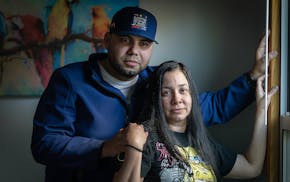The world Sam Nordquist inhabited through his phone screen was where he felt most at ease. It was where he found acceptance, established some of his deepest connections, met some of his closest friends.
The amount of time he spent socializing with apparent strangers online puzzled his friends and family, who knew him as an extrovert, a jokester, a charmer.
But it was not entirely surprising. He had dreams of fame, which he hoped to realize by uploading videos and livestreaming his everyday life, sometimes for hours at a time.
And for a young, Black transgender man living in the suburbs of Minneapolis with his mother and older brother, social media represented a landscape of endless possibility in his search for belonging, unbound by geography and often free of baggage or judgment.
Last September, he traveled to upstate New York to meet a woman he had begun talking to online over the summer. He considered her his girlfriend, even though they had yet to be in the same room. The trip was meant to last two weeks.
Five months later he was dead, his body discarded in the brush of a secluded farm roughly 15 miles from the roadside motel where she lived with her two young children. Nordquist was 24 years old.
The woman, Precious Arzuaga, and six other people have been charged with first-degree murder — an extraordinarily severe charge, stemming from allegations that they tortured Nordquist for weeks before he died. Prosecutors say the children, a 12-year-old girl and a 7-year-old boy, were made to participate in the torture.
Arzuaga pleaded not guilty, as did the other six people accused. Arzuaga's lawyer, William Swift, said he was "pursuing all legal avenues on her behalf." A trial date has not been set.
Without a full suite of facts or anything resembling closure, Nordquist's family has been plagued by grief, anger, endless conjecture and an agonizing series of questions.
"It just doesn't make any sense to me," said his older sister, Kayla. "I don't understand how they just decided they were going to. …"
She trailed off. The details of the case, however sparse, were too devastating to utter aloud.
Online, though, Nordquist's life and the circumstances of his death have united a devoted community that wants to talk about almost nothing else. People he never knew congregate on Facebook to organize memorials, lament the dangers facing transgender people and indulge their fascination with true crime by trading notes about the case. Nordquist's family has joined in to grieve, to vent, to find solace and to seek answers.
Beyond the sorrow and the voyeurism, Nordquist's death holds lessons about the often inscrutable digital universe where modern lives are increasingly lived — and provides tragic evidence of the risks of social media and the 21st-century scourge of loneliness.
To those he left behind, there is a brutal irony in Nordquist's vibrant digital afterlife.
"Sam wanted to be — not in this way, of course — but Sam always wanted to be famous," his sister said. "And now he is."
A TikTok love story
Like many of his generation, Nordquist treated social media like a public diary, sharing musings, insecurities and aspirations without hesitation. In one TikTok video, he rapped about coming to terms with his gender identity.
"Since I was in the third grade, I've known that I was gay, but I thought I'd never be accepted, so I always tried to change," he rhymed, before striking a defiant tone: "I will never back down, and I will never feel ashamed."
Nordquist, who was assigned female at birth, came out as a lesbian around age 13 or 14, according to his sister, and dated girls as an adolescent.
He had been struggling academically and socially, and in ninth grade he transferred to a charter school in St. Paul for students seeking an alternative learning environment. It seemed to set him on a path of self-realization for the rest of his brief life.
In high school, he volunteered at soup kitchens and shelters. He dressed as an elf at a school holiday party. Darius Husain, the director of the school, Face to Face Academy, described him as a "border dweller," someone who moved charismatically among social groups, with a particular sensitivity for people who were marginalized for being different.
Nordquist graduated in 2020, the same year he came out as transgender. (In 2023, he started hormone therapy and underwent a mastectomy.)
He began working in a group home, where his co-worker and friend Ashlee Youngs described him as a stubborn advocate for the residents. She recalled an argument about how to make instant macaroni and cheese in which Nordquist insisted, with growing fervor, that they add milk instead of settling for the basic recipe.
"But the clients like the milk!" she recalled him saying as he finally stormed out of the building.
Youngs and others also said that he always had his phone out — early in the morning, at work, at night in bed.
If he was not recording videos or livestreaming, he was video chatting with friends, sometimes while scrolling through social media on another device. On apps like LiveMe and TikTok, he met people who became some of his closest friends. Some lived hundreds of miles away. Many of them he had never seen in person.
Inevitably, his social media feeds traced the roller coaster of his romantic life.
Last August, there was heartbreak: Nordquist posted on TikTok a photograph of a woman's name tattooed on his arm, juxtaposed with another image that indicated he had gotten the tattoo removed. He included the hashtags #single and #trustnobody.
Friends and family said that he had fallen for a woman he met online who lived in Florida and that he had driven from Minnesota to meet her. Soon, they said, he realized that the woman's situation was not what she had projected online, resulting in a messy breakup.
He posted a video of himself lip-syncing to a song called "I'm Single and I'm Lit."
Those who knew Nordquist agreed on one thing above all: For all his sociability, he was deeply lonely and seeking something more in life. In the words of Youngs, "Sam was almost desperate for love."
It was in the wake of that breakup that he started communicating with Arzuaga. She was a 38-year-old mother living on the edge of Canandaigua, a small city in the Finger Lakes region of New York known for its lakefront wineries and pockets of poverty. She had reached out to him on TikTok, according to his friends.
His family members noticed the brisk turnaround. The couple posted videos lip-syncing to the same songs on TikTok. They had marathon sessions on the phone.
"They would even FaceTime and fall asleep on the phone together," Youngs said.
Throughout the rest of the summer, Nordquist posted one jubilant video after another, almost all of them featuring the same hashtag: #taken.
In September, he posted another lip-syncing music video, overlaid with the text "6 days until New York."
'A straight mess'
While Nordquist was trying to project his authentic self online, Arzuaga was doing the opposite, according to people close to her and in her sphere for decades.
Her posts on social media portrayed a playful, doting mother who exuded confidence, sex appeal and fortitude.
"I LOVE MY BABIES I'M BLESSED THANK YOU LORD FOR MY BLESSINGS," she posted once on Facebook.
In reality, she was a homeless drifter with a violent and chaotic past.
In Geneva, New York, another city in the area, she is named in nearly 200 police reports for incidents including harassment, domestic disturbances, theft and threats of violence. Public records show she was jailed at least eight times. Her past lovers — men and women — invariably described her as manipulative and abusive.
One was Desiree Tucker, 32, who tagged along last year as Arzuaga crisscrossed the country with her two young children in rented moving vans, living for stretches in Colorado, Florida, North Carolina and Pennsylvania.
"On social media, Precious claimed to be powerful, loving and caring, clean, a sweetheart, trustworthy and loyal," Tucker said. "Real-life Precious was manipulative, not loyal at all, and her life was a straight mess."
By the time Nordquist encountered her online, Arzuaga and her children had returned to the Finger Lakes, settling into Patty's Lodge, an assemblage of timeworn buildings on a two-lane highway outside Canandaigua.
The lodge was built in 1960, when roadside motels were booming. But it was forsaken over the decades by vineyard tourists and is now one of eight motels used by Ontario County to shelter people receiving housing assistance. Rooms are rented by the week, and police logs show officers are regularly summoned.
"These are all homeless people," said Manny Patel, who operates the motel. "This is a shelter."
Nordquist arrived Sept. 28 to be with Arzuaga. She let him down from the moment his plane landed in Rochester, the nearest airport.
Melissa Light, a friend of Nordquist's, said he called her to explain that Arzuaga hadn't come to meet him. He would need to hail an Uber — and sneak one last cigarette.
"He told me Precious was not going to allow him to smoke," Light said.
Still, the trip seemed to get off to a happy start.
In subsequent days, Nordquist posted video after video to TikTok celebrating his relationship. He called his family and friends and told them things were going well. He did not get on his return flight home, scheduled for Oct. 12.
Confused, his mother, Linda, called police the next day to check in on him. When officers arrived at Patty's Lodge, Nordquist told them he was fine, said Mark Eifert, a senior investigator with the New York State Police.
And it seemed so. Over the next three days, Nordquist posted at least 19 TikTok videos, most of them showing him and Arzuaga kissing, cuddling and dancing together. One featured the couple with Arzuaga's two children under the text "The New Nordquist-Arzuaga Family 2024."
The TikTok uploads continued apace until Nov. 15. Then the posts from Nordquist, who for years had shared his life on social media with an almost compulsive cadence, abruptly came to an end.
An Alarming Silence
Nordquist's communication with his family members and friends became curt and infrequent after that. More puzzling, they began finding themselves blocked from his accounts on various social media and chat apps.
Light was among those blocked. She had been battling cancer and was accustomed to talking to him about it on the phone for hours. They had never met in person — they became friends online in 2020 — but had plans to get together soon.
On Dec. 12, she texted Nordquist: "I don't know why you haven't called or texted. I don't know why you blocked me on TikTok. Whatever I did to you I apologize for. I hope you're doing well. I wish you the best in life my friend. Take care and know I'm still here and your friend."
There was no response. Later that day, she was blocked from his Facebook account.
A month later, she tried on Snapchat. She told him she had suffered a major setback in her cancer recovery. She expected a concerned phone call; instead, she received an impersonal reply: "I'm so sorry to hear that. I will pray for you. Keep me posted."
Those who knew Nordquist in Minnesota found his behavior increasingly difficult to rationalize. He had effectively abandoned his job at the group home, work he had seemed to relish, with co-workers and clients he had treated as friends. It was not until later that they realized his phone activity was most likely being controlled by Arzuaga.
"Him going offline, that was a clue that something might be wrong, because no person would keep him from being online," said Corin Kichler, a friend from Minnesota, who was also blocked for seemingly no reason.
Throughout this period, Nordquist's sister and mother struggled with how much to intervene, reasoning that he was an adult making his own choices. But they missed him.
On Feb. 7, Kayla Nordquist sent him a text message with a picture of her three young children. She and Sam had gotten into an argument before the holidays, and it had been weeks since they had spoken. She assumed they were mired in some kind of emotional standoff. But she knew he loved her children.
"I just thought you'd want to see how big they're getting," she wrote.
There was no response. The silence — and before that, coldness — felt wrong. The brother she knew liked to gossip and make people laugh. He was looking forward to this summer's Pride celebrations, which he would finally feel comfortable attending shirtless.
So, after getting no response to the picture of her children, Kayla Nordquist texted her brother again.
"Well, I hope you're doing OK and safe," she wrote. "I love and I miss you."
There was no reply. Only later would she learn the truth.
"By the time I sent those text messages," she said, "he was already gone."
On Feb. 9, Nordquist's family, increasingly worried about his silence, asked state police to check in again at Patty's Lodge. Kayla Nordquist said police told her that they had encountered a man at the door of Room 22 who made an alarming claim.
"He said Sam's never been there," she recalled. "He said he didn't even know who the officer was talking about."
Troopers eventually opened a missing persons investigation. The family had already begun spreading the word on social media.
Desperate, Nordquist's mother, sister and older brother, Mason, piled in a car and headed to New York, stopping Feb. 13 at a motel in Ohio.
At 10:38 that night, they received a call from a police officer. A body had been found in the field of a dairy farmer. Authorities believed it was Sam.
Room 22
In March, authorities outlined the details of Nordquist's death in an indictment that read like a horror story.
Beginning on Jan. 1, prosecutors said, Nordquist was physically restrained in Room 22 of Patty's Lodge. He was hit, kicked and punched; forced to stand or kneel facing a wall; sexually assaulted; deprived of food and water; forced to consume feces, urine and saliva; bound with duct tape and doused with bleach. The torture didn't cease, they said, until Feb. 2, the date they believe he was killed.
To prove the first-degree murder charges, which are rare in New York, Kelly Wolford, an assistant district attorney in Ontario County, said her office would need to show "that all seven defendants tortured Sam Nordquist, and that they did so because they enjoyed it."
Often, when people are accused of unspeakable crimes, their friends or neighbors express shock that they could be capable of such things. But many who knew Arzuaga intimately were not surprised to hear the allegations.
"I know how she is," said Carlos Ortiz-Rivera, the father of Arzuaga's 7-year-old son, who was alleged to have been forced to torture Nordquist.
Ortiz-Rivera said he met Arzuaga eight years ago when county social services placed him in a hotel she frequented. A recovering drug addict, he was so taken by her appearance and the affection she showed that he moved into a trailer with her.
But, he said, he soon discovered that she was prone to violent fits brought on by jealousy and paranoia. He pointed to a small scar on the palm of his left hand that he said he got when she stabbed him with a decorative sword.
"She'll talk good to you until she gets you," said Ortiz-Rivera, 46. "And then she turns."
Margaret Copp, 37, who has known Arzuaga since they were teenagers and was romantically involved with her as a young adult, said the same.
"The first time I was asked if she was capable of doing that, I immediately said, 'Yes,'" Copp said. "And, of course, it would not be by herself, because she's not going down alone. That was always a saying of hers, 'If I go down, I'm not going down alone.'"
Among the six others accused alongside Arzuaga is her 21-year-old son, Thomas Eaves, who was raised by his mother and grandmother in Geneva. It was by all accounts a tumultuous childhood.
Arzuaga served five stints in jail before Thomas turned 7; when he was 12, she was charged with animal neglect for locking their pit bull, Princess, in a shed without food or water. By the time he was 18, Eaves had been jailed for beating and robbing a 16-year-old autistic boy.
Larry Kasperek, a criminal defense lawyer whom Ontario County assigned to handle Eaves' case, called the allegations against his client "horrible." But he questioned the prosecution's assertion that the alleged torture lasted a month.
"I don't know how anyone could cooperate with that kind of behavior over the course of an entire month," he added. "I don't know everything that the government possesses regarding these circumstances, but the materials I have do not make out these kinds of allegations against my client."
Also arrested was Patrick Goodwin, 30, who had recently moved in at Patty's Lodge after serving eight years for engaging in criminal sexual acts with two minors. He was registered as a Level 3 sex offender, which the state considers to be "a high risk of repeat offense and a threat to public safety."
According to police, Goodwin introduced Arzuaga to his girlfriend, Kimberly Sochia, 29, and Kyle R. Sage, 33, who had spent time in prison for grand larceny and disseminating indecent materials to minors. Both have been charged as participating in the torture and killing of Nordquist.
The remaining defendants, Jennifer Quijano, 30, who was identified in the indictment as "Brooklyn," and Emily J. Motyka, 19, had personal connections to Arzuaga.
Police said Quijano was an on-again, off-again romantic partner of Arzuaga's.
Motyka, a recent graduate of Honeoye Falls-Lima High School, was working as a highway maintenance worker and living at Patty's Lodge with Arzuaga after having been introduced to her by a mutual friend, according to police.
Clark J. Zimmermann, a lawyer for Motyka, cast her as a "minor participant" and argued that the language of the first-degree murder charge, which requires the defendant to have "relished the infliction of extreme physical pain," did not apply to her.
To the puzzlement of some, prosecutors did not charge Nordquist's killing as a hate crime. In response, Wolford said the acts were "bigger than a hate crime."
An afterlife online
Nordquist was buried March 3 near his home in Minnesota.
Kayla Nordquist has tried to keep herself together, for her children. But she has felt emotionally crippled by the aftershocks of her brother's death and the questions around it.
"I have my breakdowns at night," she said.
She has leaned on social media to find community, comfort and an outlet for some of her rawest emotions, her daily stream of posts serving as a public diary of a grieving sister.
The community formed immediately after Nordquist's missing person notice appeared. Strangers reached out offering to help with the search, with fundraising, with general emotional support. Many quickly developed close ties to the family.
The nexus of these interactions has been a private Facebook group, Justice for Sam Nordquist. It has 1,400 members, many of whom never met Nordquist.
They upload artwork inspired by him. They organize conference calls to discuss his life. They plan vigils. They promote a fundraising page that has raised almost $200,000 to help the family.
The killing has also attracted the attention of true crime content creators, and the family has eagerly exchanged information with at least one of them, hoping the amateur investigations could lead to more answers beyond the basic, jarring facts of the case.
Almost every day, Kayla Nordquist has participated in this cacophony of posts, wearing her emotions on her sleeve, sometimes speaking directly to her brother.
"I wish you knew the people I have met [heart emoji]," she posted recently on Facebook. "I know you would like all of them, they have been so helpful, supportive and loving throughout this tragedy!"
In other ways, the internet has been a source of tension for her.
Transgender activism was one of the driving forces behind the outpouring of support. But the group recently debated whether it was appropriate for members to suggest, as some had, that Nordquist had "made a sacrifice" for the transgender community.
Similar disagreements have arisen over misapplied pronouns, a user who kept reacting to posts with a laughing emoji, a fake fundraising page and a podcast that made light of the tragedy.
"May God help me before I lose myself in hate," Kayla Nordquist wrote one day.
This month, the family responded to a post questioning the public nature of their mourning.
"We are a grieving family who posts about Sam several times a day," Linda Nordquist posted, "and if you don't like it or want to see it gladly remove yourself."
A few days later Kayla Nordquist reposted a quote, without any additional commentary: "People vent to social media because they aren't heard in person. Keep that in mind."
And social media, in turn, has set her along a familiar path of comfort and despair, connection and frustration.
"Sometimes it does get to be too much," Kayla Nordquist said in an interview. "The other day I just laid in bed. It all just, like, hit me, and I couldn't be on the internet all day."
She paused.
"At the same time, I can't stay off the internet, and I have to know," she said. "I need to find out."
Natasha Cornelissen contributed reporting. Kitty Bennett contributed research.

Trump says US Steel will keep HQ in Pittsburgh in a sign he'll approve bid by Japan-based Nippon

Planned Parenthood North Central States to lay off 66 workers, restructure presence in Minnesota

Roper: Let's celebrate improvements to the local bus
